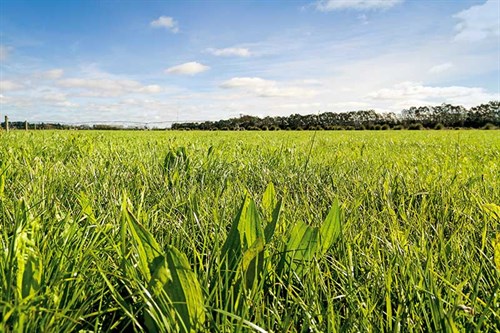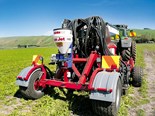Ecotain plantain may significantly reduce nitrogen leaching
Research discovers how a unique genotype of plantain, called Ecotain, can function in pasture systems to reduce nitrogen leaching from urine patches
A plantain that started life as a common weed has now been shown to have the ability to significantly reduce nitrogen leaching from the urine patch.

Proprietary seed company Agricom has bred the specific plantain genotype and says with New Zealand’s national herd number of 6.5 million dairy cattle, the breakthrough could have a significant impact on reducing nitrogen leaching from dairy farms.
The urine patch is an area that holds a concentrated amount of nitrogen from animal urine. Most nitrogen leaching from animal farms comes from the urine patch.
Agricom has been working alongside researchers at Lincoln and Massey universities and Plant & Food Research to discover how this unique genotype of plantain, called Ecotain, can function in pasture systems to reduce nitrogen leaching.
The plantain, officially deemed a herb, began life as a common flat weed (Plantago lanceloata), which Agricom bred and commercialised into a successful forage cultivar. The resulting plantain, Ecotain, is part of Agricom’s nitrogen management system NSentinel4 and works across a variety of environmental processes on-farm to decrease nitrogen leaching from the urine patch.
Agricom New Zealand sales and marketing manager Mark Brown says the NSentinel4 nitrogen management system and Ecotain have huge potential for reducing the amount of nitrogen in our environment. "New Zealanders are well-versed on the issue of nitrogen leaching and the negative effects it has on the environment.
"Ecotain is a simple and effective tool to help combat the incredibly complex issue of nitrogen leaching, and it’s a solution that has been developed by the industry, for the industry."
Agricom science lead, Dr Glenn Judson, says while plantain isn’t a new forage product (it has been used by farmers for many years), research now shows that using this specific genotype effectively can result in a significant reduction in nitrogen leaching from the
urine patch.
"Depending on the factors at play on farm and the extent to which Ecotain is used, the reduction in nitrogen leaching is very significant," he says.
"In one of the research programmes, where Ecotain is used in what is likely the optimal way, there was a reduction in nitrogen leaching by as much as 89% from the urine patch."
How Ecotain can be used

Ecotain can be used in pasture in a number of ways: as a special purpose crop where Ecotain, and often clover, are the only seeds sown, or in a grass/clover/Ecotain mixed pasture system. It can also be oversown into existing pasture.
A pure sward of Ecotain is favoured for its high summer yield and cool season activity, suited to dairy farms where the amount and quality of summer pasture often limits milk production.
Further benefits
Ecotain is highly complementary in a mixed pasture system, providing a good balance of seasonal production and summer quality, as well as being an excellent source of micronutrients such as copper and selenium.
Dr Glenn says sheep and beef farmers are currently the predominant users of the plantain, which receives favourable reports due to its good agronomic performance.
While dairy farmers are more familiar with the use of chicory on farms, due to its high feed value and resilience to dry periods, the potential of Ecotain on dairy farms is significant and the results from research so far have been impressive.
"We know that the urine patch is the greatest source of leached nitrogen. You have a cow, for example, grazing across a large area of pasture, about 140 square metres per day. When they urinate, they’re depositing a high concentration of nitrogen into a very small area compared to the size they were grazing and that small area is the urine patch.
"The plants and soil surrounding the urine patch can’t absorb all that nitrogen, so it’s easily leached away below the root zone and also into the water table. Research is showing us that controlling the nitrogen in the urine patch is the most practical way of reducing nitrogen leaching on-farm."
Four ways nitrogen leaching is reduced through Ecotain
Ecotain reduces nitrogen leaching from the urine patch in four ways: it increases the volume of cows’ urine, which dilutes the concentration of nitrogen, it reduces the total amount of nitrogen in animals’ urine, it delays the process of turning ammonium into nitrate in the urine patch, and it restricts the accumulation of nitrate in Ecotain-growing soil. In the NSentinel 4 nitrogen management system, these four mechanisms of activity are referred to as dilute, reduce, delay, and restrict.
Keep up to date in the industry by signing up to Farm Trader's free newsletter or liking us on Facebook



.jpg)
.jpeg)

.jpg)
.jpeg)
.jpg)
.jpg)






